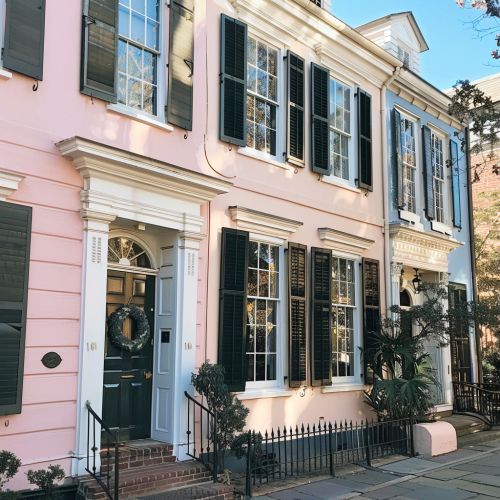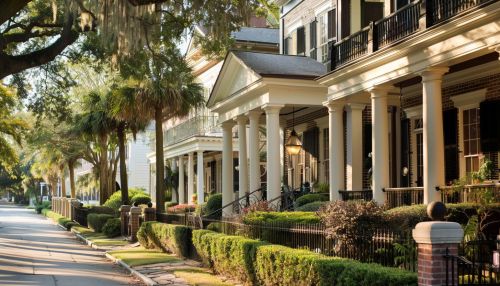Charleston
History
Charleston, a city in the southeastern United States, has a rich and complex history that dates back to its founding in 1670. Originally named Charles Town in honor of King Charles II of England, it was one of the first English settlements in the Carolinas. The city quickly became a major port and trading hub, playing a significant role in the transatlantic slave trade and the American Revolutionary War.
Colonial Era
During the colonial era, Charleston was a bustling port city, exporting rice, indigo, and cotton. The city's economy was heavily reliant on plantation economy and the labor of enslaved Africans. By the mid-18th century, Charleston had become the wealthiest and largest city in the South. The city's architecture from this period, including the iconic single houses, reflects its prosperity.
Revolutionary War
Charleston played a pivotal role in the American Revolutionary War. The city was the site of several key battles, including the Siege of Charleston in 1780, which resulted in a major British victory. Despite this, Charleston's strategic importance continued to make it a focal point for both British and American forces throughout the war.
Civil War
Charleston is perhaps best known for its role in the American Civil War. The first shots of the war were fired at Fort Sumter in Charleston Harbor on April 12, 1861. The city endured a lengthy blockade and several attacks by Union forces, leading to significant destruction and hardship for its residents. The war's end brought about the abolition of slavery, fundamentally transforming Charleston's social and economic landscape.
Geography
Charleston is located on a peninsula formed by the confluence of the Ashley and Cooper Rivers, which flow into the Atlantic Ocean. The city's unique geography has shaped its development and character over the centuries.
Climate
Charleston has a humid subtropical climate, characterized by hot, humid summers and mild winters. The city is prone to hurricanes and tropical storms, which have historically caused significant damage. The climate has also influenced the city's architecture, with many buildings designed to maximize airflow and provide shade.
Natural Features
The surrounding Lowcountry region is known for its marshes, tidal creeks, and barrier islands. These natural features provide important habitats for a variety of wildlife and have made Charleston a popular destination for ecotourism.
Economy
Charleston's economy has evolved significantly over the centuries, transitioning from a plantation-based economy to a diverse and modern economic landscape.
Early Economy
In its early years, Charleston's economy was dominated by agriculture, particularly the cultivation of rice, indigo, and cotton. The city's port facilitated trade with Europe, the Caribbean, and other American colonies.
Industrialization
The post-Civil War period saw the decline of the plantation economy and the rise of industrialization. Charleston developed a manufacturing sector, producing goods such as textiles, chemicals, and machinery. The city's port continued to play a crucial role in its economic development.
Modern Economy
Today, Charleston's economy is diverse, with key sectors including tourism, technology, healthcare, and education. The city is home to several major employers, including the Medical University of South Carolina and Boeing. Charleston's port remains one of the busiest on the East Coast, handling a significant volume of containerized cargo.
Culture
Charleston is renowned for its rich cultural heritage, which reflects its diverse history and influences.
Architecture
The city's historic district is a treasure trove of well-preserved buildings, ranging from Georgian and Federal-style homes to Greek Revival and Italianate structures. Notable landmarks include the Nathaniel Russell House and the Aiken-Rhett House.


Cuisine
Charleston's culinary scene is a reflection of its history and geography. The city is famous for its Lowcountry cuisine, which features dishes such as shrimp and grits, she-crab soup, and Hoppin' John. The use of local ingredients, including seafood, rice, and vegetables, is a hallmark of Charleston's food culture.
Festivals and Events
Charleston hosts a variety of festivals and events throughout the year, celebrating its arts, music, and culinary traditions. The Spoleto Festival USA is one of the city's most prominent cultural events, attracting artists and performers from around the world.
Education
Charleston is home to several institutions of higher education, contributing to its reputation as a center of learning and innovation.
Colleges and Universities
The College of Charleston, founded in 1770, is one of the oldest universities in the United States. The city is also home to the Medical University of South Carolina (MUSC), a leading medical research and teaching institution. Other notable institutions include The Citadel, a military college, and Charleston Southern University.
Research and Innovation
Charleston's universities and research institutions are involved in a wide range of scientific and technological research. MUSC, in particular, is known for its contributions to medical research, including studies on cancer, cardiovascular disease, and neuroscience.
Transportation
Charleston's transportation infrastructure has evolved to meet the needs of its growing population and economy.
Roads and Highways
The city is served by several major highways, including Interstate 26, which connects Charleston to Columbia and other inland cities. The Arthur Ravenel Jr. Bridge, a cable-stayed bridge over the Cooper River, is a notable landmark and a key transportation link.
Public Transit
Charleston Area Regional Transportation Authority (CARTA) provides public bus services throughout the city and surrounding areas. The city is also exploring options for expanding its public transit system, including the possibility of a light rail network.
Port and Shipping
The Port of Charleston is one of the busiest and most important ports on the East Coast. It handles a significant volume of containerized cargo and is a major hub for international trade. The South Carolina Ports Authority oversees the port's operations and development.
Demographics
Charleston's population is diverse, reflecting its history as a major port city and cultural melting pot.
Population Growth
Charleston has experienced significant population growth in recent years, driven by factors such as economic opportunities, quality of life, and cultural attractions. The city's population is projected to continue growing in the coming decades.
Racial and Ethnic Composition
Charleston's population is racially and ethnically diverse. According to the most recent census data, the city's population is approximately 70% White, 25% African American, and 5% other races and ethnicities. The city has a growing Hispanic and Latino community, as well as a significant number of residents of Asian descent.
Socioeconomic Indicators
Charleston's median household income is higher than the national average, reflecting the city's strong economy and high quality of life. However, there are significant disparities in income and wealth, with some neighborhoods experiencing higher levels of poverty and unemployment.
Government
Charleston operates under a mayor-council form of government, with a mayor elected by the city's residents and a city council responsible for legislative functions.
Mayor
The mayor of Charleston is the chief executive officer of the city, responsible for overseeing the administration of city government and implementing policies and programs. The mayor is elected to a four-year term and may serve multiple terms.
City Council
The Charleston City Council is composed of 12 members, each representing a different district within the city. The council is responsible for passing ordinances, approving the city budget, and addressing issues affecting the community. Council members are elected to four-year terms.
Municipal Services
The city provides a range of municipal services, including public safety, sanitation, parks and recreation, and public works. The Charleston Police Department and Charleston Fire Department are responsible for ensuring the safety and security of residents and visitors.
Notable Residents
Charleston has been home to many notable individuals throughout its history, including politicians, artists, and scholars.
Historical Figures
John C. Calhoun, a prominent statesman and vice president of the United States, was born in the Charleston area. Calhoun was a leading advocate for states' rights and played a significant role in the politics of the antebellum South.
Contemporary Figures
Charleston has also produced a number of contemporary figures in various fields. Notable residents include Stephen Colbert, a comedian and television host, and Darius Rucker, a musician and lead singer of the band Hootie & the Blowfish.
